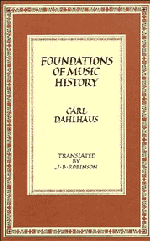Book contents
- Frontmatter
- Contents
- Translator's preface
- Foreword
- 1 Is history on the decline?
- 2 The significance of art: historical or aesthetic?
- 3 What is a fact of music history?
- 4 Does music history have a ‘subject’?
- 5 Historicism and tradition
- 6 Hermeneutics in history
- 7 The value-judgment: object or premise of history?
- 8 The ‘relative autonomy’ of music history
- 9 Thoughts on structural history
- 10 Problems in reception history
- Bibliography
- Index
7 - The value-judgment: object or premise of history?
Published online by Cambridge University Press: 01 June 2011
- Frontmatter
- Contents
- Translator's preface
- Foreword
- 1 Is history on the decline?
- 2 The significance of art: historical or aesthetic?
- 3 What is a fact of music history?
- 4 Does music history have a ‘subject’?
- 5 Historicism and tradition
- 6 Hermeneutics in history
- 7 The value-judgment: object or premise of history?
- 8 The ‘relative autonomy’ of music history
- 9 Thoughts on structural history
- 10 Problems in reception history
- Bibliography
- Index
Summary
Historians, according to their philosopher critics, are inescapably embroiled in a contradiction which can be summed up roughly in the following formula: an historian's need to rely on subjective judgments stands in direct proportion to the degree of objectivity he seeks in his history. However dispassionately and impartially he tries to reconstruct ‘the way it really was’, he is nonetheless compelled to distinguish between essential things that ‘belong to history’ and inessential things that can safely be disregarded. And he does this on the basis of criteria which are thoroughly subjective, being rooted in his own background and social position, in his beliefs and experiences. Nor does positing a collective rather than an individual subject for written history substantially affect this problem.
Yet these philosophical doubts as to the notion of objectivity in history are cast in terms that vary between two extremes. One is undisguised ill-will and resentment; the other is a subtle scepticism which defers matters to a final arbiter. This scepticism, however, at least admits the possibility that history can withstand what Jürgen Habermas has called the dialectics of ‘knowledge and interest’ – i.e. the difficulty that an ineradicably subjective element is apparently both a condition for and a barrier to historical insight – by subjecting them to a continuing process of reflection. Historians can keep the problem at bay, as it were, by probing it with ever greater refinement.
- Type
- Chapter
- Information
- Foundations of Music History , pp. 85 - 107Publisher: Cambridge University PressPrint publication year: 1983
- 1
- Cited by

